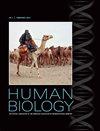Paternal Origins of Mongolic-Speaking Populations: A Review of Studies from Recent Decades (1999–2019) and Their Implications for Multidisciplinary Research in the Future
4区 生物学
Q2 Medicine
引用次数: 0
Abstract
The activities of Mongolic-speaking populations, a large group of people in eastern Eurasia, have important impacts on the history of East Asia and other parts of Eurasia. Most previous genetic research of East Asian populations, including ancient DNA studies, has involved samples from Mongolic-speaking populations or their ancient relatives. This review summarizes frequency data of paternal Y-chromosome haplogroups from all available literature about Mongolic-speaking populations from 1999 to 2019. Fourteen paternal components were identified, and six of them are proposed as major and common components in ancestor groups of Mongolic-speaking populations. The article thoroughly discusses the possible origin, migration patterns, and the roles of these six components in the evolutionary history of Mongolic-speaking populations, as well as implications of present achievements in human genetics for future multidisciplinary research in ethnology, history, archaeology, and linguistics.蒙古族人口的父系起源:近几十年(1999-2019)研究综述及其对未来多学科研究的启示
蒙古人是欧亚大陆东部的一大民族,他们的活动对东亚和欧亚大陆其他地区的历史产生了重要影响。以前对东亚人群的大多数基因研究,包括古代DNA研究,都涉及到讲蒙古语的人群或他们的古代亲属的样本。本文综述了1999 - 2019年蒙古语人群父系y染色体单倍群的频率数据。鉴定出14种父系成分,其中6种是蒙古族人群祖先群的主要成分和共同成分。本文深入探讨了蒙古族人口可能的起源、迁移模式和这六个组成部分在蒙古族人口进化史中的作用,以及目前人类遗传学研究成果对未来民族学、历史学、考古学和语言学等多学科研究的启示。
本文章由计算机程序翻译,如有差异,请以英文原文为准。
求助全文
约1分钟内获得全文
求助全文
来源期刊

Human Biology
生物-生物学
CiteScore
1.90
自引率
0.00%
发文量
88
审稿时长
>12 weeks
期刊介绍:
Human Biology publishes original scientific articles, brief communications, letters to the editor, and review articles on the general topic of biological anthropology. Our main focus is understanding human biological variation and human evolution through a broad range of approaches.
We encourage investigators to submit any study on human biological diversity presented from an evolutionary or adaptive perspective. Priority will be given to interdisciplinary studies that seek to better explain the interaction between cultural processes and biological processes in our evolution. Methodological papers are also encouraged. Any computational approach intended to summarize cultural variation is encouraged. Studies that are essentially descriptive or concern only a limited geographic area are acceptable only when they have a wider relevance to understanding human biological variation.
Manuscripts may cover any of the following disciplines, once the anthropological focus is apparent: human population genetics, evolutionary and genetic demography, quantitative genetics, evolutionary biology, ancient DNA studies, biological diversity interpreted in terms of adaptation (biometry, physical anthropology), and interdisciplinary research linking biological and cultural diversity (inferred from linguistic variability, ethnological diversity, archaeological evidence, etc.).
 求助内容:
求助内容: 应助结果提醒方式:
应助结果提醒方式:


